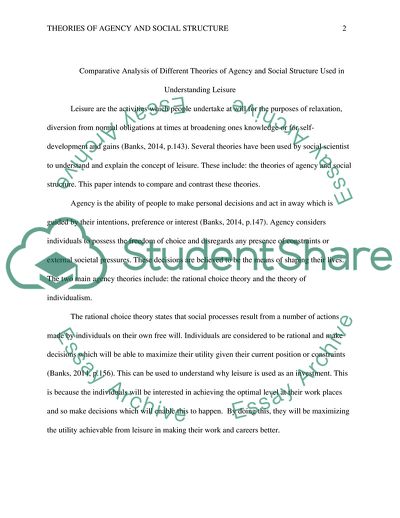Cite this document
(Theories of Agency and Social Structure in Understanding Leisure Essay Example | Topics and Well Written Essays - 1500 words, n.d.)
Theories of Agency and Social Structure in Understanding Leisure Essay Example | Topics and Well Written Essays - 1500 words. https://studentshare.org/sociology/1876809-compare-and-contrast-the-different-theories-of-agency-and-social-structure-and-how-they-help-social-scientists-to-understand-leisure
Theories of Agency and Social Structure in Understanding Leisure Essay Example | Topics and Well Written Essays - 1500 words. https://studentshare.org/sociology/1876809-compare-and-contrast-the-different-theories-of-agency-and-social-structure-and-how-they-help-social-scientists-to-understand-leisure
(Theories of Agency and Social Structure in Understanding Leisure Essay Example | Topics and Well Written Essays - 1500 Words)
Theories of Agency and Social Structure in Understanding Leisure Essay Example | Topics and Well Written Essays - 1500 Words. https://studentshare.org/sociology/1876809-compare-and-contrast-the-different-theories-of-agency-and-social-structure-and-how-they-help-social-scientists-to-understand-leisure.
Theories of Agency and Social Structure in Understanding Leisure Essay Example | Topics and Well Written Essays - 1500 Words. https://studentshare.org/sociology/1876809-compare-and-contrast-the-different-theories-of-agency-and-social-structure-and-how-they-help-social-scientists-to-understand-leisure.
“Theories of Agency and Social Structure in Understanding Leisure Essay Example | Topics and Well Written Essays - 1500 Words”. https://studentshare.org/sociology/1876809-compare-and-contrast-the-different-theories-of-agency-and-social-structure-and-how-they-help-social-scientists-to-understand-leisure.


